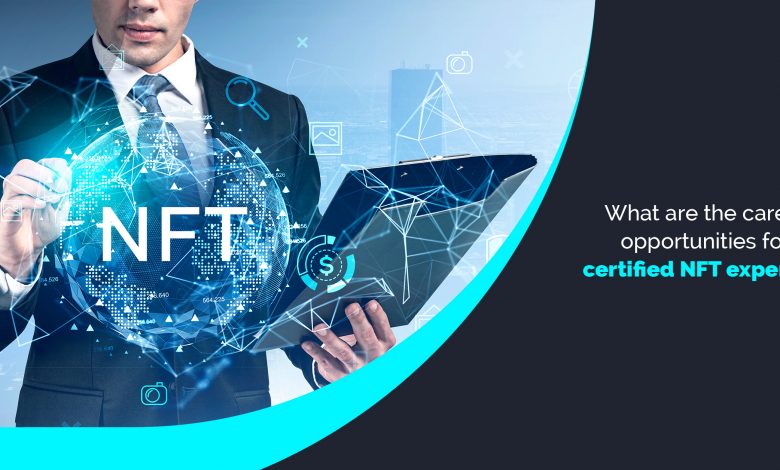What are the career opportunities for a certified NFT expert?

It’s a different world here. It’s all about imagination. Even though the IT business is always evolving, it has the greatest capacity to accept new and different ideas. The latest buzz in town is NFT, or Non-Fungible Token, which functions similarly to bitcoins. The only difference is that each NFT is different, or to put it another way, unique, making trading and exchanging them impossible.
Non-fungible tokens have already grabbed the world’s creative community by storm, and experts think they can totally revolutionize the world of art in the future.
NFT crypto has gained a lot of traction, and they’ve broadened the definition of art to include things like memes, tweets, and photographs. Furthermore, they address the age-old issue of art authentication, avoiding copying, and ensuring that creators receive proper royalties for the sale of their work.
non-fungible tokens own digital assets like photos, music files, and text. It’s the same as if you had a Bitcoin wallet. The difference is that cryptocurrencies have a fixed value and can be traded, but NFT does not. Each NFT is a one-of-a-kind creation. Everything is contingent on the buyer’s willingness to pay. It can be exceedingly valuable if the best NFT is created by a well-known artist and the buyer is a passionate and wealthy collector.
What exactly are NFTs?
A digital asset that reflects real-world elements like as art, music, in-game goods, and movies is known as an NFT. They’re bought and traded online, often using cryptocurrency, and they’re usually encoded with the same software as many other cryptos.
NFTs are digital assets, to put it simply. They can be purchased and traded in the same way that traditional assets can, but each one is identified by a unique code that is recorded on the blockchain Platform. This code aids in identifying the NFT’s original owner. However, creating a token is a difficult task. When you consider the significant energy usage and environmental costs, NFTs become rather exclusive.
The promise of permanence, originality, ownership, singularity, and uniqueness associated with these NFTs has grabbed the imagination of notable personalities throughout the world, from Twitter creator Jack Dorsey to artist Grimes. According to a survey issued by L’Atelier BNP Paribas and Nonfungible.com, the market rose by 299 percent, reaching a total value of more than 250 billion dollars in 2020.
But, most crucially, NFTs give a work of art credit and a tag of permanency, allowing its mobility to be monitored and therefore allowing artists to earn royalties without having to rely on a middleman or third party. Smart contracts, which are programs built with pre-specified execution conditions and saved on the blockchain, make this feasible. Artists will be able to earn and sustain a living, as well as have more control over their work and art, as a result of this.
What Makes NFT So Special?
NFTs are non-fungible, which means they are one-of-a-kind. For example, your cellphones, laptops, PlayStation 5, cosmetics kit, and anything else in your environment that has the same value to everyone and can be readily replaced are fungible.
NFTs are items that only exist in digital form and may be purchased and owned. Artwork is a good example of something that cannot be replaced.
An NFT permits the buyer to keep the original object. It also comes with built-in authentication, which acts as evidence of ownership. Those “digital bragging rights” are almost as valuable as the object itself to collectors.
How Do NFTs Function?
NFTs, as previously stated, are digital certificates that may be purchased or sold just like any other valued object. When you purchase an NFT, you will obtain a certificate that is protected by Blockchain Technology and identifies you as the owner of that digital asset.
Without requesting permission, anybody may make, purchase, and trade an NFT. Cybercriminals will have a hard time hacking or tampering with these assets since they are held in an encrypted peer-to-peer network.
Is there a comparison between NFTs and Bitcoin?
While both NFTs and Bitcoin are considered cryptocurrencies, NFTs differs in that it cannot be used as a medium for business transactions directly.
Bitcoin is fungible, meaning that it may be traded or swapped for other currencies. The value of one bitcoin, for example, is equal to the value of another bitcoin. This is not the case with NFTs, though.
How Can You Buy or Sell NFTs?
NFTs, like any other cryptocurrency, may be bought and sold. Install Metamask, a digital wallet for Ethereum, the second most popular cryptocurrency after Bitcoin, to do this.
You may purchase Ethereum after installing Metamask. You may now use the ethereum you purchased to purchase an NFT from any website that offers them. By linking your Metamask account to the crypto exchange Uniswap, you may also trade NFTs.
Why should one take the NFT certificate course?
NFTs (non-fungible tokens) are one of the most talked-about issues in the blockchain industry right now. Many individuals are interested in learning NFT after a recent $70 million NFT sale. Non-fungible tokens have proven to be an extremely beneficial tool for digitally representing real-world assets. One of the reasons for people’s interest in learning about NFT fundamentals is because of their distinctiveness.
The NFT Fundamentals course delves deeply into the fundamentals of NFT, including the distinction between fungibility and non-fungibility. The course also includes a detailed explanation of how NFTs function and how they affect the digital asset ecosystem. Learners will also have a thorough understanding of the NFT project ecosystem, which includes collectibles, trading cards, games, utilities, virtual world, and marketplace applications.
With the increased use of NFT in the IT industry, it is quickly becoming a desired must-have trait that every recruiter wants. NFT certification might give you a leg up on the competition. The NFT specialist can distinguish between fungible and non-fungible assets. Individuals who complete NFT training can help enhance blockchain technology for non-fungible assets.
Non-fungible token certification will give an in-depth understanding of non-fungible tokens, as well as related technologies like blockchain and Ethereum-based blockchain. They can also create decentralized applications and smart contracts.
What industries may NFT experts work in?
Thanks to the advancement of blockchain and blockchain-based technologies, the number of NFT use cases is expanding by the day. Many sectors are currently utilizing the services of NFT professionals, and many more are contemplating doing so. Here are a few examples:
- Gaming
- Virtual reality
- Digital art
- Fashion designing
- Certification and licensing
- Sports
- Decentralized finance
- Market places
- Collectibles
- Ethereum name service and domain
All of the aforementioned sectors are searching for NFT experts to assist them in developing new initiatives that will stand out and provide them a competitive advantage.
What kind of work can an NFT expert do?
NFT experts with NFT training can use their talents in several sectors after successfully completing the certificate course. Among them are the following:
- A blockchain developer
- A smart contract developer
- A blockchain project manager
- A blockchain consultant
- An Ethereum developer
- An Ethereum expert
- A blockchain architect
Wrapping up
In the fields of economics and finance, non-fungible tokens have emerged as attractive notions. NFTs are one-of-a-kind digital assets that consumers may purchase and sell just like any other asset. NFTs, on the other hand, lack any tangibility in their form; digital tokens might be thought of as certificates of ownership for real or virtual goods.
The use of NFTs has expanded in lockstep with the advancement of blockchain technology. It means that there would be an increase in demand for NFT specialists, meaning that traditional studies or courses will be unable to give the edge or creativity necessary for the profile. Although it is a new course, it has a lot of opportunity for development and has the potential to help students develop both emotionally and professionally.
With so many opportunities for progress in the IT business, it’s safe to assume that NFT experts have a lot of opportunities to grow. The professional advancement of an NFT specialist is significantly faster than that of someone who is inexperienced with non-fungible tokens.




